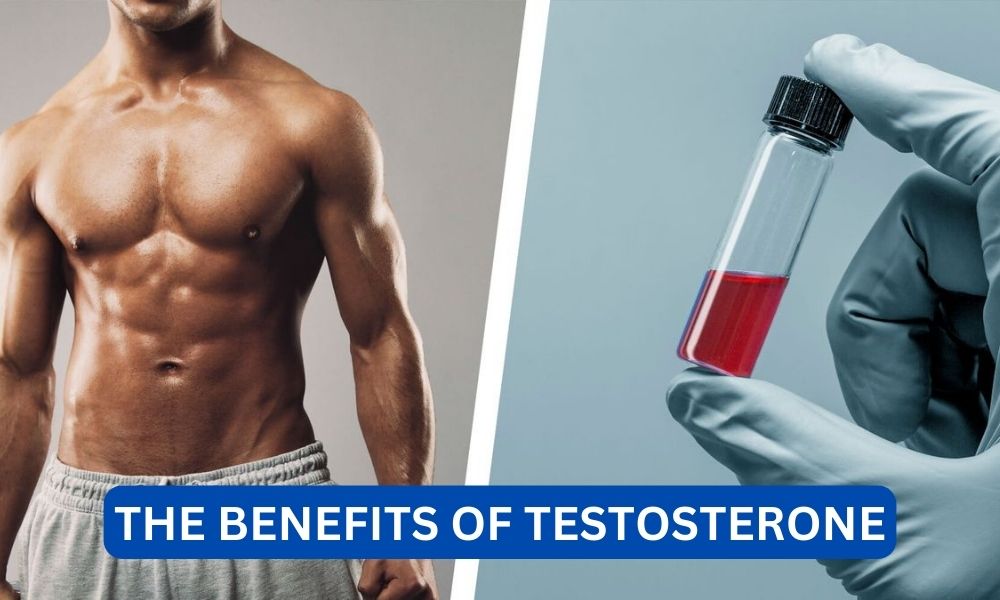Testosterone is a hormone that is primarily associated with masculinity and male characteristics. However, it is also present in females, although in smaller amounts. This hormone plays a crucial role in the development and maintenance of various bodily functions, including muscle mass, bone density, and sex drive. In recent years, there has been a growing interest in the benefits of testosterone, not just for men but also for women. In this article, we will explore the various benefits of testosterone and why it is essential for both men and women.
Contents
What is Testosterone?
Testosterone is a hormone that belongs to the androgen group, which is responsible for the development of male characteristics. It is primarily produced in the testicles in men and the ovaries in women, with small amounts also being produced in the adrenal glands. In men, testosterone levels are at their highest during puberty and early adulthood, and then gradually decline with age. In women, testosterone levels are much lower, but they also decrease with age.
Testosterone plays a crucial role in the development and maintenance of male characteristics, such as facial and body hair, deepening of the voice, and muscle mass. It also has a significant impact on sexual function and libido in both men and women. However, testosterone has many other benefits that are often overlooked.
Read:What are the benefits of metformin?The Benefits of Testosterone for Men
Testosterone is often associated with masculinity and male characteristics, but it also has many other benefits for men. Here are some of the key benefits of testosterone for men:
- Increased Muscle Mass and Strength: Testosterone is essential for the development and maintenance of muscle mass and strength. It stimulates protein synthesis, which is crucial for muscle growth, and also helps to prevent muscle breakdown. This is why testosterone is often used by athletes and bodybuilders to enhance their performance and build muscle mass.
- Improved Bone Density: Testosterone is also essential for maintaining strong and healthy bones. It helps to increase bone density, which is crucial for preventing conditions like osteoporosis, especially in older men.
- Enhanced Libido and Sexual Function: Testosterone plays a significant role in sexual function and libido in men. It is responsible for the development of male sex organs and also helps to maintain a healthy sex drive. Low testosterone levels can lead to a decrease in libido and sexual function, which can have a significant impact on a man’s quality of life.
- Improved Mood and Cognitive Function: Testosterone has been linked to improved mood and cognitive function in men. Low testosterone levels have been associated with depression, irritability, and difficulty concentrating. By increasing testosterone levels, men may experience improved mood and cognitive function.
- Reduced Risk of Cardiovascular Disease: Testosterone has been shown to have a protective effect on the heart. It helps to regulate blood pressure and cholesterol levels, reducing the risk of cardiovascular disease. Low testosterone levels have been linked to an increased risk of heart disease, making it essential to maintain healthy levels of this hormone.
The Benefits of Testosterone for Women
While testosterone is often thought of as a male hormone, it also plays a crucial role in women’s health. Here are some of the key benefits of testosterone for women:
Read:What are the benefits of weed?- Increased Bone Density: Just like in men, testosterone is essential for maintaining strong and healthy bones in women. As women age, their testosterone levels decline, which can lead to a decrease in bone density and an increased risk of osteoporosis. By maintaining healthy levels of testosterone, women can help prevent these conditions.
- Improved Libido and Sexual Function: Testosterone is also crucial for sexual function and libido in women. It helps to maintain a healthy sex drive and is responsible for the development of female sex organs. Low testosterone levels in women can lead to a decrease in libido and sexual function, which can have a significant impact on their quality of life.
- Increased Muscle Mass and Strength: Testosterone is also important for women’s muscle mass and strength. It helps to stimulate protein synthesis, which is crucial for muscle growth, and also helps to prevent muscle breakdown. This is why some women may choose to supplement with testosterone to enhance their athletic performance and build muscle mass.
- Improved Mood and Cognitive Function: Testosterone has also been linked to improved mood and cognitive function in women. Low testosterone levels have been associated with depression, irritability, and difficulty concentrating. By increasing testosterone levels, women may experience improved mood and cognitive function.
- Reduced Risk of Cardiovascular Disease: Testosterone has been shown to have a protective effect on the heart in women as well. It helps to regulate blood pressure and cholesterol levels, reducing the risk of cardiovascular disease. Low testosterone levels have been linked to an increased risk of heart disease in women, making it essential to maintain healthy levels of this hormone.
The Benefits of Testosterone for Aging Adults
As we age, our testosterone levels naturally decline. This can lead to a variety of health issues, including decreased muscle mass, decreased bone density, and a decrease in libido and sexual function. However, supplementing with testosterone can have many benefits for aging adults, including:
Read:What are the benefits of watermelon- Increased Muscle Mass and Strength: Testosterone supplementation can help to increase muscle mass and strength in aging adults. This can help to prevent age-related muscle loss and maintain overall physical function.
- Improved Bone Density: Testosterone can also help to increase bone density in aging adults, reducing the risk of osteoporosis and fractures.
- Enhanced Libido and Sexual Function: Testosterone supplementation can help to improve libido and sexual function in aging adults, improving their quality of life.
- Improved Mood and Cognitive Function: Testosterone has been linked to improved mood and cognitive function in aging adults. By supplementing with testosterone, older adults may experience improved mental clarity and overall well-being.
- Reduced Risk of Cardiovascular Disease: Testosterone supplementation can also have a protective effect on the heart in aging adults. It can help to regulate blood pressure and cholesterol levels, reducing the risk of heart disease.
The Benefits of Testosterone for Those with Low Testosterone Levels
Some individuals may have naturally low levels of testosterone, which can lead to a variety of health issues. In these cases, testosterone replacement therapy can have many benefits, including:
- Increased Muscle Mass and Strength: Testosterone replacement therapy can help to increase muscle mass and strength in individuals with low testosterone levels. This can help to improve physical function and overall quality of life.
- Improved Bone Density: Testosterone replacement therapy can also help to increase bone density in individuals with low testosterone levels, reducing the risk of osteoporosis and fractures.
- Enhanced Libido and Sexual Function: Testosterone replacement therapy can help to improve libido and sexual function in individuals with low testosterone levels, improving their quality of life.
- Improved Mood and Cognitive Function: Testosterone has been linked to improved mood and cognitive function in individuals with low testosterone levels. By undergoing testosterone replacement therapy, these individuals may experience improved mental clarity and overall well-being.
- Reduced Risk of Cardiovascular Disease: Testosterone replacement therapy can also have a protective effect on the heart in individuals with low testosterone levels. It can help to regulate blood pressure and cholesterol levels, reducing the risk of heart disease.
The Risks of Testosterone Supplementation
While testosterone supplementation can have many benefits, it is essential to understand the potential risks associated with it. Some of the potential risks of testosterone supplementation include:
- Increased Risk of Prostate Cancer: There is some evidence that testosterone supplementation may increase the risk of prostate cancer in men. However, more research is needed to confirm this link.
- Acne and Oily Skin: Testosterone supplementation can lead to an increase in oil production, which can cause acne and oily skin.
- Fluid Retention: Testosterone supplementation can cause fluid retention, which can lead to swelling in the hands and feet.
- Increased Risk of Blood Clots: Testosterone supplementation may increase the risk of blood clots, which can be dangerous if they travel to the lungs or brain.
- Enlarged Breasts: In some cases, testosterone supplementation can lead to the development of enlarged breasts in men.
It is essential to consult with a healthcare professional before starting testosterone supplementation to understand the potential risks and benefits for your specific situation.
Conclusion:
In conclusion, testosterone is a crucial hormone that plays a significant role in the development and maintenance of various bodily functions. While it is often associated with masculinity and male characteristics, it also has many benefits for women, aging adults, and those with low testosterone levels. From increasing muscle mass and strength to improving bone density and sexual function, testosterone is essential for overall health and well-being. However, it is essential to understand the potential risks associated with testosterone supplementation and consult with a healthcare professional before starting any treatment. By maintaining healthy levels of testosterone, individuals can experience the many benefits of this hormone and improve their quality of life.









